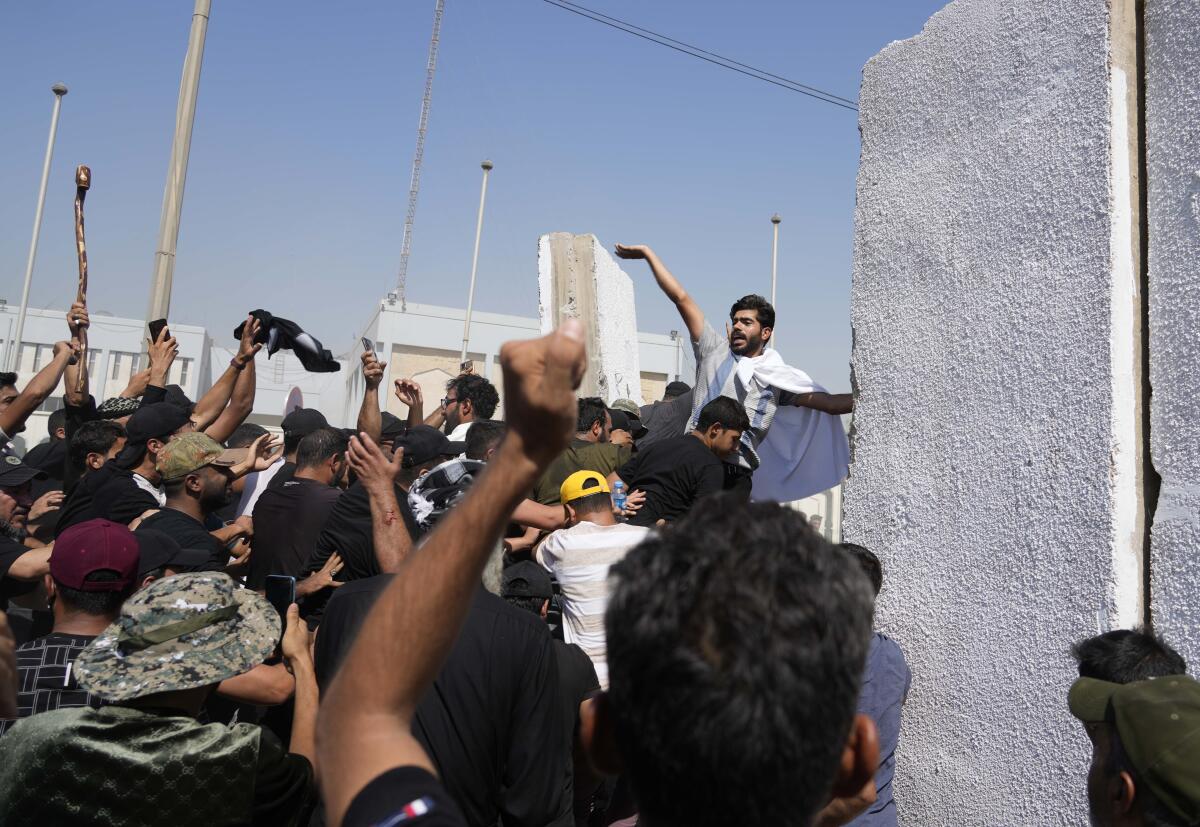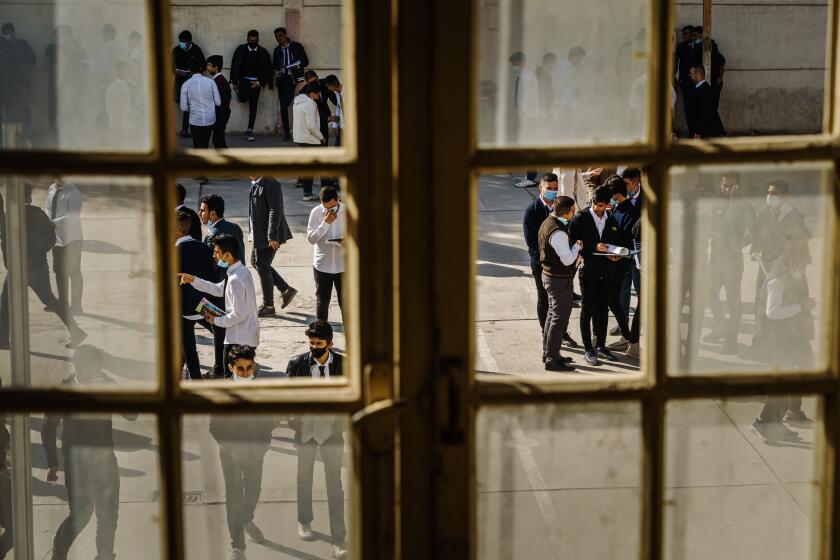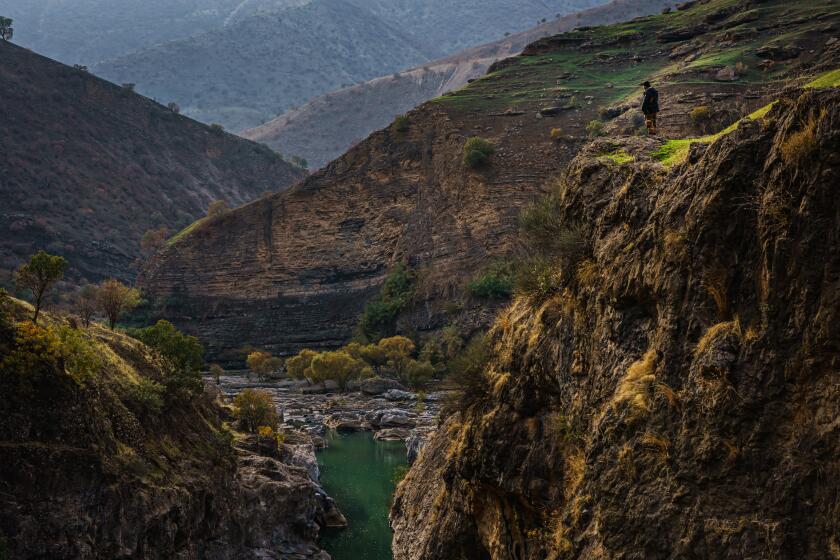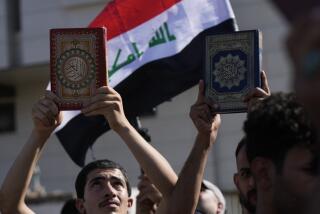Protesters storm Iraq’s government palace after Shiite cleric says he’ll retire

BAGHDAD — An influential Shiite cleric announced Monday that he would resign from Iraqi politics, prompting hundreds of his angry followers to storm the government palace and sparking clashes with security forces. At least 15 protesters were killed.
Protesters loyal to cleric Muqtada Sadr pulled down the concrete barriers outside the government palace with ropes and breached the palace gates. Many rushed into the lavish salons and marbled halls of the palace, a key meeting place for Iraqi heads of state and foreign dignitaries.
Iraq’s military announced a nationwide curfew, and the caretaker premier suspended Cabinet sessions in response to the violence. Medical officials said gunfire and tear gas and physical altercations with riot police left dozens of protesters wounded.
As night fell, Saraya Salam, a militia aligned with Sadr, clashed with the Popular Mobilization Forces security group. Members of the special forces division and the Iraqi army’s 9th Division also joined to contain the militants as the clashes continued for hours inside the Green Zone, the seat of government.
At least one soldier from the special forces division, which is responsible for security in the Green Zone, was killed. Many others, including a civilian woman, were wounded, two security officials said. Several mortar rounds were heard.
The crackle of machine gun fire echoed throughout central Baghdad.
For much of the world, Iraq is a distant tragedy. But for its children raised amid chaos and war, that legacy has defined their generation.
The Popular Mobilization Forces is an umbrella group of state-sanctioned paramilitary organizations, the most powerful of which are aligned with Sadr’s rivals in the Iran-backed political camp.
Security officials said mortar rounds and rocket-propelled grenades were used in the clashes, a culmination of intractable political impasse between the rival camps.
Iraq’s government has been deadlocked since Sadr’s party won the largest share of seats in October parliamentary elections but not enough to secure a majority government. His refusal to negotiate with his Iran-backed Shiite rivals and subsequent exit from the talks have catapulted the country into political uncertainty and volatility amid intensifying intra-Shiite wrangling.
Iraq’s majority Muslim population is split into two sects, Shiites and Sunnis. Under Saddam Hussein, the Shiites were oppressed until the U.S.-led invasion reversed the political order. Now the Shiites are fighting among themselves, with the dispute centering on power and state resources but also influence over the Shiite street.
To further his political interests, Sadr has wrapped his rhetoric with a nationalist and reform agenda that resonates powerfully among his broad grass-roots base of supporters who hail from Iraq’s poorest sectors of society and have historically been shut out from the political system.
Many were first followers of his father, a revered figure in Shiite Islam. They are calling for the dissolution of parliament and early elections without the participation of Iran-backed Shiite groups, which they see as responsible for the status quo.
During Monday’s clashes, Saraya Salam gathered in the capital’s Tahrir Square to “protect” protesters, one of its commanders said.
A senior medical official confirmed at least 15 protesters were killed by gunfire.
Ancient humans are believed to have first begun land cultivation in Iraq. Their modern-day counterparts are giving it up.
Iraq’s caretaker premier said that he would open an investigation into the shootings and that the use of live ammunition against protesters was forbidden.
Protests also broke out in the Shiite-majority southern provinces, with Sadr supporters burning tires and blocking roads in the oil-rich province of Basra and hundreds demonstrating outside the governorate building in Maysan.
Iran considers intra-Shiite disharmony as a threat to its influence in Iraq and has repeatedly attempted to broker dialogue with Sadr.
In July, Sadr supporters broke into the parliament to deter his rivals in the Coordination Framework, an alliance of mostly Iran-aligned Shiite parties, from forming a government. Hundreds have been staging a sit-in outside the building for over four weeks. His bloc has also resigned from parliament. The Coordination Framework is led by Sadr’s chief nemesis, former Prime Minister Nouri Maliki.
This is not the first time Sadr, who has called for early elections and the dissolution of parliament, has announced his retirement from politics — and many dismissed Monday’s move as another bluff to gain greater leverage against his rivals amid a worsening stalemate. The cleric has used the tactic on previous occasions when political developments did not go his way.
But many are concerned that it’s a risky gambit and are worried about how it will affect Iraq’s fragile political climate. By stepping out of the political process, Sadr is giving his followers, most disenfranchised from the political system, the green light to act as they see fit.
Sadr also commands a militia and maintains a great degree of influence within Iraq’s state institutions through the appointments of key civil servant positions. His Iran-backed rivals also have militia groups.
Iraq’s military swiftly called on the cleric’s supporters to withdraw immediately from the heavily fortified government zone and to practice self-restraint “to prevent clashes or the spilling of Iraqi blood,” according to a statement.
“The security forces affirm their responsibility to protect government institutions, international missions, public and private properties,” the statement said.
Caretaker Prime Minister Mustafa Kadhimi also demanded that Sadr call on his followers to withdraw from government institutions.
The United Nations mission in Iraq said Monday’s protests were an “extremely dangerous escalation” and called on demonstrators to vacate all government buildings to allow officials to continue running the state.
It urged all to remain peaceful and “refrain from acts that could lead to an unstoppable chain of events.”
Breaking News
Get breaking news, investigations, analysis and more signature journalism from the Los Angeles Times in your inbox.
You may occasionally receive promotional content from the Los Angeles Times.
“The very survival of the state is at stake,” the statement said.
Sadr announced his withdrawal from politics in a tweet, and ordered the closure of his party offices. Religious and cultural institutions will remain open, it said.
His announcement appeared to be a reaction to the retirement of Shiite spiritual leader Ayatollah Kazem Haeri, who counts many of Sadr’s supporters as followers.
In a surprise announcement Sunday, Haeri said he would be stepping down as a religious authority for health reasons and called on his followers to throw their allegiance behind Iran’s Ayatollah Ali Khamenei, rather than the Shiite spiritual center in Iraq’s holy city of Najaf.
The move was a blow to Sadr, who, despite harboring ambitions to be a religious authority, lacks the scholarly credentials to be an ayatollah. Haeri, who resides in the Iranian holy city of Qom, once provided him with the legitimacy he lacked by designating Sadr as his representative in Iraq. He cut ties shortly after with the cleric, but continued to enjoy the support of his followers.
By calling on his followers to side with Khamenei, Haeri brought on a crisis of legitimacy for Sadr.
In his tweet, Sadr said Haeri’s stepping down “was not out of his own volition.”
More to Read
Sign up for Essential California
The most important California stories and recommendations in your inbox every morning.
You may occasionally receive promotional content from the Los Angeles Times.












